不定代词用法总结
不定代词的用法

不定代词的用法不定代词是指在句中代替不明确或不确定的名词的一类代词。
它们在句子中充当名词的成分,起到代替和指代的作用。
不定代词可以用来表示数量、身份、归属、程度、时间等概念。
在英语中,不定代词有多种形式和用法,本文将对其常见的用法进行探讨。
一、不定代词的形式和用法1. some和anya. some用于肯定句中,表示某种或某些。
b. any用于否定句和疑问句中,表示任何的、任何一种或任何一些。
例句:- Could you give me some water, please?(请给我些水好吗?)- I don't have any money.(我没有一分钱。
)2. all和botha. all用于肯定句中,表示全部或所有的。
b. both用于肯定句中,表示两者都。
例句:- All students must attend the assembly.(所有学生都必须参加集会。
)- Both of them are my friends.(他们两个都是我的朋友。
)3. each和everya. each表示每一个(两者或两者以上的人或事物)。
b. every表示每一个(三个或三个以上的人或事物)。
例句:- Each student should bring their own books.(每位学生应该带自己的书。
)- Every child loves ice cream.(每个孩子都喜欢冰淇淋。
)4. someone和anyonea. someone用于肯定句中,表示某人或有人。
b. anyone用于否定句和疑问句中,表示任何人或任何一人。
例句:- I saw someone waiting for you at the station.(我看到有人在车站等你。
)- Have you seen anyone around here?(你在这附近见过任何人吗?)5. something和anythinga. something用于肯定句中,表示某物或有物。
不定代词用法总结

不定代词用法总结-标准化文件发布号:(9556-EUATWK-MWUB-WUNN-INNUL-DDQTY-KII不定代词用法总结1) some, any, no的用法a. some和any通常用于表示不定数或不定量,修饰复数可数名词或不可数名词。
some表示“几个;一些;部分”,多用于肯定句;而any表示“一些;什么;任何;”,对用于否定句或疑问句中。
如:* He asked me some questions. (他问了我几个问题。
) * Some of the bread has been eaten. (面包已吃了一些。
) * Are there any stamps in this post office(这个邮局里有邮票吗?)* I didn’t have any cigarettes, so I went out to buy some. (我没有香烟了,所以出去买了一些。
)b. 刚才我们说some一般用于肯定句而any一般用于否定句和疑问句。
但有时也有例外。
这要根据句子意思来看。
* I could not answer some of his questions. (我不能回答他的某些问题。
)(some用在否定句中表示“一些;部分”。
如果说成:I could not answer any of his questions.意思就变了,它表示“我不能回答他的任何问题。
”)* Will you get me some apples on your way back (你回来的路上能给我带一些苹果吗?)(some用在疑问句中大多表示“请求” 或“建议”)* Let me know if you hear any news. (如果你有任何消息请告诉我。
) (any用在条件从句中表示“任何”)* “What would you like to drink”“Any will do.” (“你想喝什么?”“哪种都行。
不定代词用法总结

不定代词用法总结1)some,any,no的用法a。
some和any通常用于表示不定数或不定量,修饰复数可数名词或不可数名词。
some表示“几个;一些;部分”,多用于肯定句;而any表示“一些;什么;任何;”,对用于否定句或疑问句中.如:*He asked me some questions。
(他问了我几个问题。
)*Some of the bread has been eaten。
(面包已吃了一些。
)*Are there any stamps in this post office? (这个邮局里有邮票吗?)*I didn’t have any cigarettes, so I went out to buy some。
(我没有香烟了,所以出去买了一些。
)b. 刚才我们说some一般用于肯定句而any一般用于否定句和疑问句。
但有时也有例外。
这要根据句子意思来看。
* I could not answer some of his questions. (我不能回答他的某些问题.)(some用在否定句中表示“一些;部分”.如果说成:I could not answer any of his questions.意思就变了,它表示“我不能回答他的任何问题。
”)*Will you get me some apples on your way back?(你回来的路上能给我带一些苹果吗?)(some用在疑问句中大多表示“请求” 或“建议")*Let me know if you hear any news. (如果你有任何消息请告诉我。
) (any用在条件从句中表示“任何")* “What would you like t o drink?” “Any will do.” (“你想喝什么?”“哪种都行。
”) (any在这里表示“任何”)c. no在句子中作定语,表示否定,意思是“没有;不是”,它可以修饰可数名词的单数和复数形式或不可数名词.* There are no letters for you today. (今天没有你的信。
不定代词的用法归纳
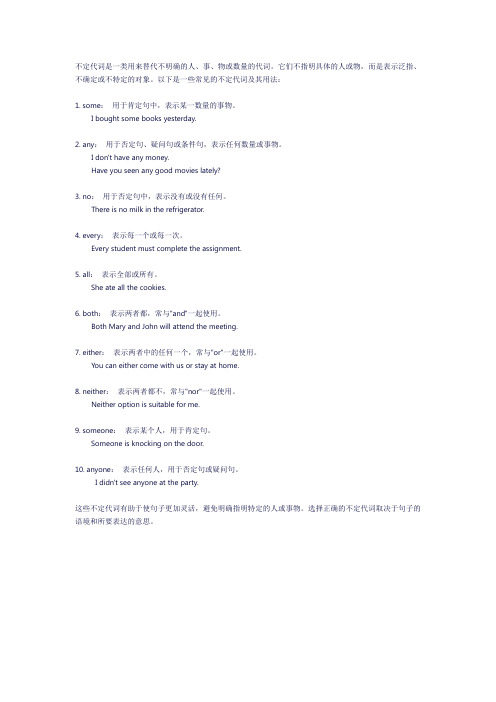
不定代词是一类用来替代不明确的人、事、物或数量的代词。
它们不指明具体的人或物,而是表示泛指、不确定或不特定的对象。
以下是一些常见的不定代词及其用法:1. some:用于肯定句中,表示某一数量的事物。
I bought some books yesterday.2. any:用于否定句、疑问句或条件句,表示任何数量或事物。
I don't have any money.Have you seen any good movies lately?3. no:用于否定句中,表示没有或没有任何。
There is no milk in the refrigerator.4. every:表示每一个或每一次。
Every student must complete the assignment.5. all:表示全部或所有。
She ate all the cookies.6. both:表示两者都,常与"and"一起使用。
Both Mary and John will attend the meeting.7. either:表示两者中的任何一个,常与"or"一起使用。
You can either come with us or stay at home.8. neither:表示两者都不,常与"nor"一起使用。
Neither option is suitable for me.9. someone:表示某个人,用于肯定句。
Someone is knocking on the door.10. anyone:表示任何人,用于否定句或疑问句。
I didn't see anyone at the party.这些不定代词有助于使句子更加灵活,避免明确指明特定的人或事物。
选择正确的不定代词取决于句子的语境和所要表达的意思。
不定代词用法总结

不定代词:代替或修饰不特指的人或事物的代词叫不定代词.any用于肯定句时,意思是“任何的”。
Come here with any friend.(随便带什么朋友来吧。
)no和none的用法:no是形容词,只能作定语表示,意思是“没有”,修饰可数名词(单数或复数)或不可数名词.如:There is no time left。
Please hurry up.(没有时间了,请快点)/ They had no reading books to lend.(他们没有阅读用书可以出借)none只能独立使用,在句子中可作主语、宾语和表语,意思是“没有一个人(或事物)”,表示复数或单数。
如:None of them is/are in the classroom。
(他们当中没有一个在教室里)/ I have many books,but none is interesting.(我有很多的书,但没有一本是有趣的)either和neither的用法:either意思是“两个中间的任何一个”;neither是either的否定形式,意思是“两个都不"。
neither和either在句子中可作主语、宾语和定语等,都用作单数。
如:I don't care much for what to drink。
Either of the two will do。
(我不介意喝些什么,两个之中随便哪个都行)/ —-Will yougo there by bus or by car? –Neither. I will go there by train。
(你坐公车去还是坐轿车去?一个都不坐,我坐火车去。
)other、the other和another的用法:other意思是“另一"、“另一些”,有复数形式。
在句子中可作主语、宾语和定语。
another意思是“另外”、“又一个”,表示增加,在句中可作宾语和定语.如:Some girls are singing under the big apple tree and others are sitting on the grass talking。
不定代词用法总结

不定代词用法总结不定代词是在句子中代替特定人或物的词语,它们的使用能够让句子更加简洁明了。
下面是对不定代词的用法做一个总结。
1. 一般不定代词一般不定代词包括"something"、"anything"、"nothing"、"everything"等,它们用来代替不具体指向的事物。
例如:- I have something to tell you.- Is there anything I can do for you?- Don't worry, it's nothing serious.- She knows everything about that topic.2. 不定代词"some"和"any""some"和"any"可以用作不定代词,也可以用作不定代词,具体使用要根据句子的语境来确定。
当"some"用作不定代词时,表示肯定或推测的意思。
例如:- There are some books on the table.- Can I have some water, please?当"any"用作不定代词时,表示否定或疑问的意思。
- I don't have any money with me.- Do you have any ideas for the project?3. 不定代词"somebody"、"anybody"、"nobody"和"everybody"这些不定代词用来代替人。
它们的使用方式类似于前面提到的一般不定代词。
例如:- Somebody is waiting for you outside.- Nobody knows the answer.- Can anybody help me with this problem?- Everybody enjoyed the party.4. 不定代词"each"和"every""each"和"every"用来代替三者或多者中的每一个。
不定代词用法总结
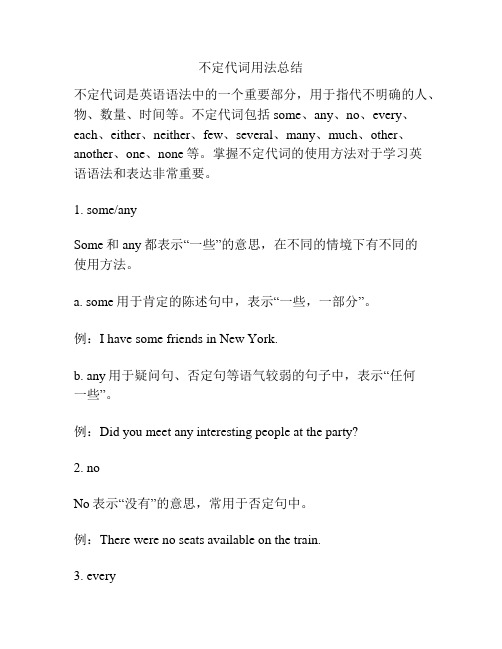
不定代词用法总结不定代词是英语语法中的一个重要部分,用于指代不明确的人、物、数量、时间等。
不定代词包括some、any、no、every、each、either、neither、few、several、many、much、other、another、one、none等。
掌握不定代词的使用方法对于学习英语语法和表达非常重要。
1. some/anySome和any都表示“一些”的意思,在不同的情境下有不同的使用方法。
a. some用于肯定的陈述句中,表示“一些,一部分”。
例:I have some friends in New York.b. any用于疑问句、否定句等语气较弱的句子中,表示“任何一些”。
例:Did you meet any interesting people at the party?2. noNo表示“没有”的意思,常用于否定句中。
例:There were no seats available on the train.3. everyEvery表示“每一个”的意思。
例:Every student is required to attend the meeting.4. eachEach表示“每一个”,用于强调个体。
例:Each student is responsible for his or her own progress.5. either/neitherEither表示“两者中的任何一个”,neither表示“两者都不”。
例:You can choose either the blue or the red dress.例:Neither of us likes to cook.6. few/several/many/much这些代词都用于表示数量或程度。
a. few表示“很少,几乎没有”。
例:There were few people in the park on such a hot day.b. several表示“几个,若干”。
不定代词的用法归纳
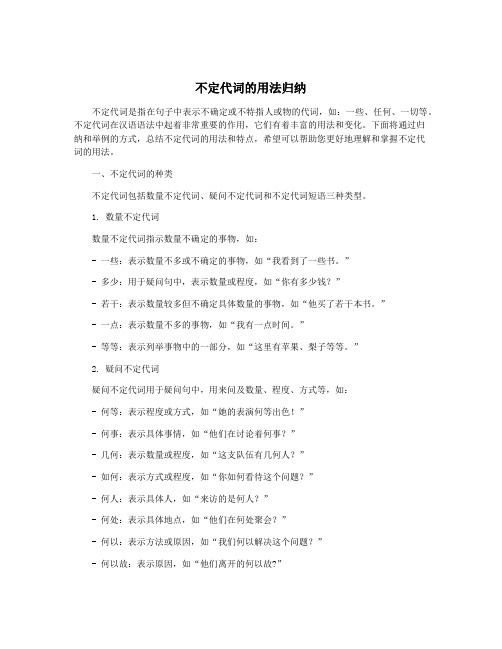
不定代词的用法归纳不定代词是指在句子中表示不确定或不特指人或物的代词,如:一些、任何、一切等。
不定代词在汉语语法中起着非常重要的作用,它们有着丰富的用法和变化。
下面将通过归纳和举例的方式,总结不定代词的用法和特点,希望可以帮助您更好地理解和掌握不定代词的用法。
一、不定代词的种类不定代词包括数量不定代词、疑问不定代词和不定代词短语三种类型。
1. 数量不定代词数量不定代词指示数量不确定的事物,如:- 一些:表示数量不多或不确定的事物,如“我看到了一些书。
”- 多少:用于疑问句中,表示数量或程度,如“你有多少钱?”- 若干:表示数量较多但不确定具体数量的事物,如“他买了若干本书。
”- 一点:表示数量不多的事物,如“我有一点时间。
”- 等等:表示列举事物中的一部分,如“这里有苹果、梨子等等。
”2. 疑问不定代词疑问不定代词用于疑问句中,用来问及数量、程度、方式等,如:- 何等:表示程度或方式,如“她的表演何等出色!”- 何事:表示具体事情,如“他们在讨论着何事?”- 几何:表示数量或程度,如“这支队伍有几何人?”- 如何:表示方式或程度,如“你如何看待这个问题?”- 何人:表示具体人,如“来访的是何人?”- 何处:表示具体地点,如“他们在何处聚会?”- 何以:表示方法或原因,如“我们何以解决这个问题?”- 何以故:表示原因,如“他们离开的何以故?”3. 不定代词短语不定代词短语是由一个或多个词组成的不定代词,如:- 有的(少数):表示有一部分事物,如“有的学生不喜欢数学。
”- 无论(不分别):表示两者都一样,如“无论贫富,人生都应该平等。
” - 也许(或许):表示可能性,如“也许他今天会来。
”- 可能(或许):表示可能性,如“他可能迟到了。
”- 不论(无论):表示两者都一样,如“不论去哪里,我都会支持你。
”二、不定代词的用法1. 作主语不定代词可以作为句子的主语来表示不定的人或物,如:- 任何人都可以报名参加。
不定代词用法

e.g: 1)He looked for his pen everywhere . 2) This summer he stayed at home or go nowhere .
训练场
1、She looked inside the box, but she saw__D___ in it .
e.g : 1) Someone is knocking at the door, isn’t he / aren’t
they ?
2) There, everything goes well , doesn’t it ?
6、复合不定代词作主语时,谓语动词必须用单数形 式。
e.g : 1) Everything begins to grow in spring. 2) There is something new in today’s newspaper .
Your penfriend,
Sun Xiaoli
A. Can it B. can’t it C. can they D. can’t they
4、We must find_A_____ to do the work .
A. Somebody careful B. careful nobody
C. Nobody careful
D. careful somebody
No . The table hasn’t been set yet .
A. Anything B. everything C.nothing D. something
作 文 点 评(范文)
Dear Emily, I'm sorry to hear that you are ill again. My mom often tells something about how to stay healthy. I will tell you what she tells me. She often says, “Drink more milk and water.”She asks me to eat more fruit and vegetables. She says that I should eat vegetables at least three times a day . She also encourages me to go outside and play . I like to play basketball with my friends. Maybe you could do the same. I think my mom's advice is good . Maybe you can try the same and see if it helps. I hope you get well soon .
不定代词用法归纳

不定代词用法归纳一、不定代词概说英语的不定代词有 all, each, both, either, neither, one, none, little, few, many, much,other, another, some, any, no, (a) few, (a) little, both, enough, every 等,以及由 some, a ny, no 和 every 构成的合成代词(即 somebody, anyone, nothing 等)。
在这些不定代词中,多数都能作主语、宾语、表语或定语,但是代词 none 以及由 some, any, no 和 every 构成的合成代词只能作主语、宾语或表语,不能作定语,而 no 和 every 则只用作定语。
二、指两者和三者的不定代词有些不定代词用于指两者(如 both, either, neither),有的不定代词用于指三者 (如 all, an y, none, every) ,注意不要弄混:Both of my parents are doctors. 我的父母都是医生。
All of the students are interested in it. 所有的学生对此都很感兴趣。
There are trees on any side of the square. 广场的每一边都种有树。
He has two sons, neither of whom is rich. 他有两个儿子,都不富有。
He has three sons, none of whom is rich. 他有三个儿子,都不富有。
【说明】each 可用于两者、三者或三者以上,而 every 只用于三者或三者以上,因此用于两者时只能用 each,不能用 every 。
如不能说 There are trees on every side of the ro ad.三、复合不定代词的用法特点复合不定代词包括 something, somebody, someone, anything, anybody, anyone, nothin g, nobody, no one, everything, everybody, everyone 等。
完整版)不定代词用法总结
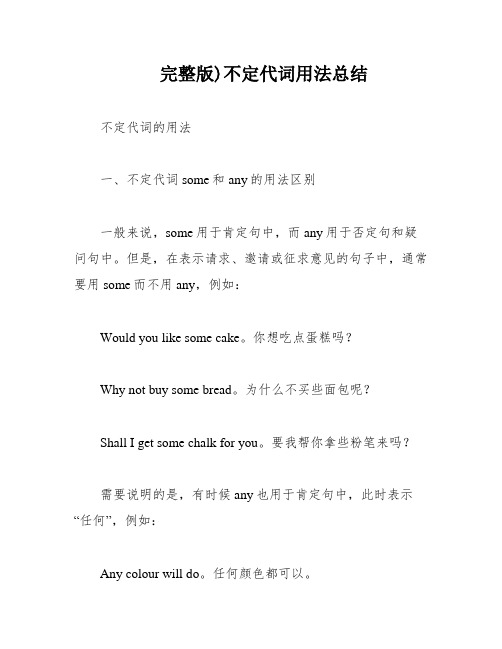
完整版)不定代词用法总结不定代词的用法一、不定代词some和any的用法区别一般来说,some用于肯定句中,而any用于否定句和疑问句中。
但是,在表示请求、邀请或征求意见的句子中,通常要用some而不用any,例如:Would you like some cake。
你想吃点蛋糕吗?Why not buy some bread。
为什么不买些面包呢?Shall I get some chalk for you。
要我帮你拿些粉笔来吗?需要说明的是,有时候any也用于肯定句中,此时表示“任何”,例如:Any colour will do。
任何颜色都可以。
Come any day you like。
你随便哪天来都可以。
二、不定代词many和much的用法以及区别不定代词many和much都表示“许多”,但many修饰或代替可数名词(复数),与few(少数)相对;而much用来修饰或代替不可数名词(单数),与little(少量)相对。
在口语中,两者主要用于非肯定句中,例如:Did you see many people there。
你在那儿看见许多人了吗?We don’t have much time。
我们没有许多时间。
XXX work has been done。
许多工作都已经做了。
You’ve given me too much。
你给我太多了。
Take as many (much) as you want。
你要多少拿多少。
I asked her a great many ns。
我问了她许多问题。
另外需要注意的是,too much可以作副词或代词,也可以用作形容词修饰不可数名词,例如:Is watching TV too much good or bad for your health。
看电视太多对你的健康有益还是有害?You’ve given me too much。
你给我的太多了。
We’ve had too much rain lately。
不定代词的用法总结
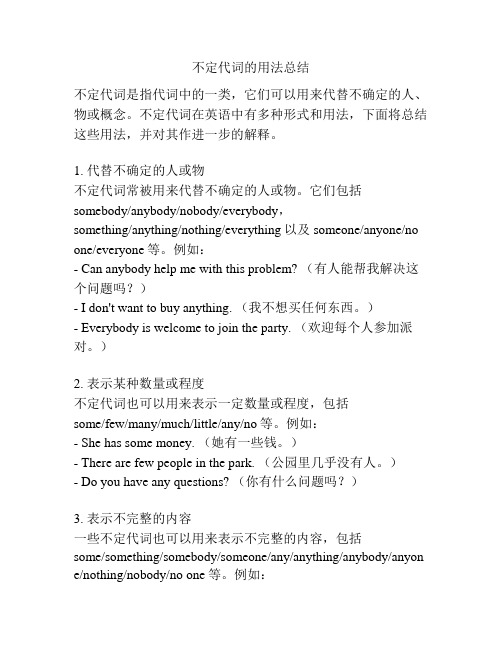
不定代词的用法总结不定代词是指代词中的一类,它们可以用来代替不确定的人、物或概念。
不定代词在英语中有多种形式和用法,下面将总结这些用法,并对其作进一步的解释。
1. 代替不确定的人或物不定代词常被用来代替不确定的人或物。
它们包括somebody/anybody/nobody/everybody,something/anything/nothing/everything以及someone/anyone/no one/everyone等。
例如:- Can anybody help me with this problem? (有人能帮我解决这个问题吗?)- I don't want to buy anything. (我不想买任何东西。
)- Everybody is welcome to join the party. (欢迎每个人参加派对。
)2. 表示某种数量或程度不定代词也可以用来表示一定数量或程度,包括some/few/many/much/little/any/no等。
例如:- She has some money. (她有一些钱。
)- There are few people in the park. (公园里几乎没有人。
)- Do you have any questions? (你有什么问题吗?)3. 表示不完整的内容一些不定代词也可以用来表示不完整的内容,包括some/something/somebody/someone/any/anything/anybody/anyon e/nothing/nobody/no one等。
例如:- I have something to tell you. (我有件事要告诉你。
)- Is there anyone who can help me? (有人可以帮帮我吗?)- She knows nothing about it. (她对此一无所知。
不定代词用法总结3

不定代词用法总结3不定代词用法总结不定代词是指在句中代替不确定的人或物的代词,它们具有代词的特点,可以在句中作主语、宾语、表语等成分。
本文将总结不定代词的用法,以帮助读者更好地理解和运用这一语法知识。
一、不定代词的基本用法1. 人称不定代词:someone, anybody, nobody, everyone等,用来代替不确定的人,常用作主语或宾语。
- 例如:Someone called you while you were out.- 译文:有人给你打电话,你出门时他来了。
2. 物称不定代词:something, anything, nothing, everything等,用来代替不确定的物,也可用作主语或宾语。
- 例如:He didn't say anything about the incident.- 译文:他对那个事情没说什么。
3. 两者不定代词:either, neither, both等,用来表示两者中的一个或两者都不是,常用作主语或宾语。
- 例如:Either of you can come with me.- 译文:你们中的任何一个都可以和我一起去。
二、不定代词在句中的具体用法1. 作主语:- Everyone wants to succeed in life.- 译文:每个人都想在人生中取得成功。
2. 作宾语:- She asked me if I had anything to eat.- 译文:她问我是否有东西吃。
3. 作表语:- The winner could be anyone.- 译文:获胜者可能是任何人。
4. 作定语:- Is there any room available for the night?- 译文:晚上有空房间吗?5. 作状语:- He left without saying anything.- 译文:他走了,什么也没说。
三、不定代词的注意事项1. 每个不定代词都有其固定的语法用法,需要根据具体语境来选择使用,不能随意替换。
不定代词的用法归纳
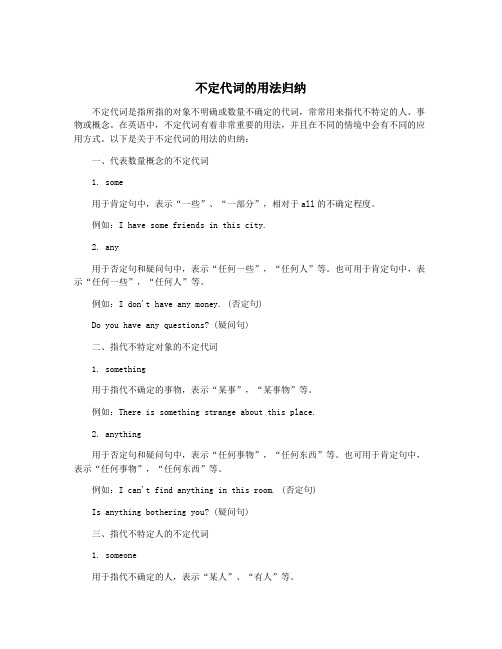
不定代词的用法归纳不定代词是指所指的对象不明确或数量不确定的代词,常常用来指代不特定的人、事物或概念。
在英语中,不定代词有着非常重要的用法,并且在不同的情境中会有不同的应用方式。
以下是关于不定代词的用法的归纳:一、代表数量概念的不定代词1. some用于肯定句中,表示“一些”、“一部分”,相对于all的不确定程度。
例如:I have some friends in this city.2. any用于否定句和疑问句中,表示“任何一些”,“任何人”等。
也可用于肯定句中,表示“任何一些”,“任何人”等。
例如:I don't have any money. (否定句)Do you have any questions? (疑问句)二、指代不特定对象的不定代词1. something用于指代不确定的事物,表示“某事”,“某事物”等。
例如:There is something strange about this place.2. anything用于否定句和疑问句中,表示“任何事物”,“任何东西”等。
也可用于肯定句中,表示“任何事物”,“任何东西”等。
例如:I can't find anything in this room. (否定句)Is anything bothering you? (疑问句)三、指代不特定人的不定代词1. someone用于指代不确定的人,表示“某人”、“有人”等。
例如:I saw someone waiting for you outside.2. anyone用于否定句和疑问句中,表示“任何人”,“任何人物”等。
也可用于肯定句中,表示“任何人”,“任何人物”等。
例如:I don't want to talk to anyone right now. (否定句)Has anyone called for me? (疑问句)四、表示不定数量或程度的不定代词1. much用于肯定句和否定句中,表示“很多”,“大量”等。
不定代词的用法与常见例句

不定代词的用法与常见例句不定代词(Indefinite Pronouns)是代词的一种,用于代替不确定或不特指的人或物。
它们常常出现在句子中,起到代替名词、短语或从句的作用。
本文将介绍几种常见的不定代词及其用法,并附上相应的例句。
1. 一般不定代词一般不定代词用于泛指人或物,没有特定的指向。
常见的一般不定代词有:a) Something:某事或某物例句:I found something interesting in the bookstore.b) Someone:某人例句:Someone is waiting for you at the door.c) Anyone:任何人例句:Can anyone help me carry these boxes?2. 否定不定代词否定不定代词用于表示否定,包括否定词形式及部分any/ever/no合成词形式。
常见的否定不定代词有:a) Nothing:没有任何事物或事情例句:There is nothing to worry about.b) Nobody:没有人例句:Nobody wants to go to the party with me.c) Anywhere:任何地方例句:I don't want to go anywhere today.d) Never:从不例句:She never eats fast food.3. 断定不定代词断定不定代词用于指代确定的人或物。
常见的断定不定代词有:a) All:所有例句:All students must attend the meeting.b) Both:两者都例句:Both of them passed the exam.c) Each:每个例句:Each student needs to submit a report.d) Either:两者中的任意一个例句:You can choose either option.4. 不定代词与动词的一致不定代词与动词在人称和数上要保持一致。
不定代词用法总结
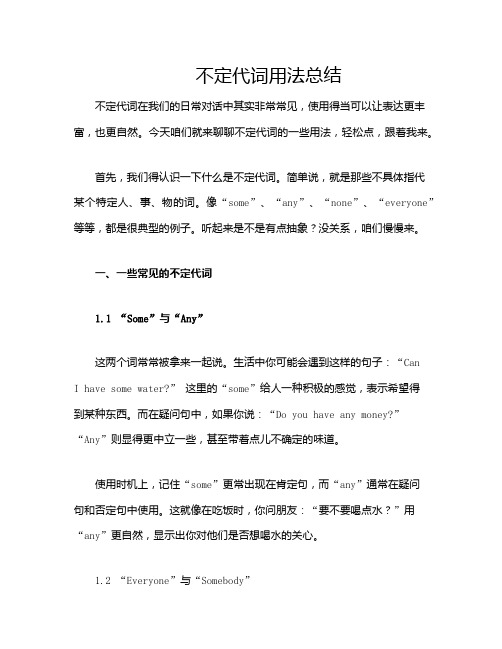
不定代词用法总结不定代词在我们的日常对话中其实非常常见,使用得当可以让表达更丰富,也更自然。
今天咱们就来聊聊不定代词的一些用法,轻松点,跟着我来。
首先,我们得认识一下什么是不定代词。
简单说,就是那些不具体指代某个特定人、事、物的词。
像“some”、“any”、“none”、“everyone”等等,都是很典型的例子。
听起来是不是有点抽象?没关系,咱们慢慢来。
一、一些常见的不定代词1.1 “Some”与“Any”这两个词常常被拿来一起说。
生活中你可能会遇到这样的句子:“Can I have some water?” 这里的“some”给人一种积极的感觉,表示希望得到某种东西。
而在疑问句中,如果你说:“Do you have any money?” “Any”则显得更中立一些,甚至带着点儿不确定的味道。
使用时机上,记住“some”更常出现在肯定句,而“any”通常在疑问句和否定句中使用。
这就像在吃饭时,你问朋友:“要不要喝点水?”用“any”更自然,显示出你对他们是否想喝水的关心。
1.2 “Everyone”与“Somebody”这两个代词同样重要。
“Everyone”意味着所有人,而“somebody”则更模糊。
比如,你可以说:“Everyone loves a good story.” 这是一个普遍的真理。
而“Somebody told me a secret.” 这句则让人感觉更神秘,像是在说一个小道消息。
在社交场合中,如果你想让谈话更加轻松,可以试着用这些代词。
比如:“Somebody once said, life is like a box of chocolates.” 这样的话语瞬间拉近了与听众的距离。
二、否定形式与强调形式2.1 “Nobody”与“Nothing”这些词用起来很方便,特别是在表达否定的时候。
想想看,当你说:“Nobody wants to be alone.” 这就传达了人们普遍的情感。
不定代词用法总结
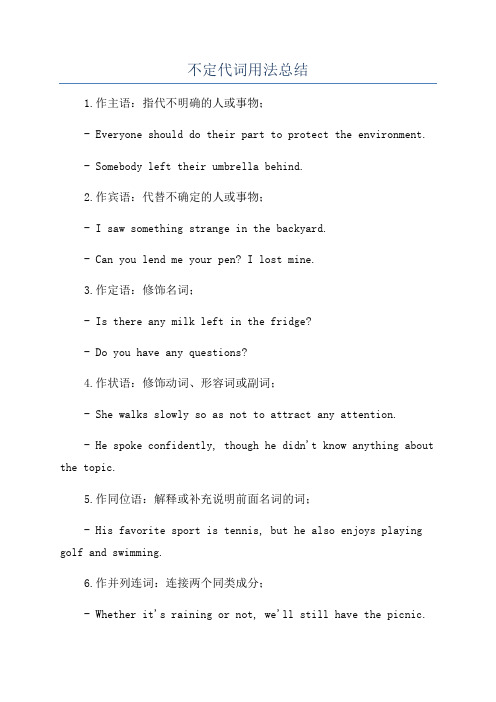
不定代词用法总结1.作主语:指代不明确的人或事物;- Everyone should do their part to protect the environment.- Somebody left their umbrella behind.2.作宾语:代替不确定的人或事物;- I saw something strange in the backyard.- Can you lend me your pen? I lost mine.3.作定语:修饰名词;- Is there any milk left in the fridge?- Do you have any questions?4.作状语:修饰动词、形容词或副词;- She walks slowly so as not to attract any attention.- He spoke confidently, though he didn't know anything about the topic.5.作同位语:解释或补充说明前面名词的词;- His favorite sport is tennis, but he also enjoys playing golf and swimming.6.作并列连词:连接两个同类成分;- Whether it's raining or not, we'll still have the picnic.7.作插入语:用于句子中,表示强调、感叹或补充说明;- Honestly, I don't know what to do in this situation.- Wow, that's incredible!总之,不定代词用于代表不明确的人或事物,作为主语、宾语、定语等部分。
同时,不定代词也可以用作并列连词、插入语等。
不定代词的用法总结

不定代词的用法总结不定代词是我们日常语言中经常使用的一种词类,它可以在句子中代替一般名词或特定人或物。
不定代词的使用能够简化句子结构,提高表达的灵活性。
以下将从不同角度总结不定代词的用法。
1. 代替特定人或物有时候我们并不想具体指定一个人或物,这时候就可以使用不定代词来代替特定的名词。
比如,在说到一个未知的人时,我们可以使用"someone";在谈论未知的物品时,我们可以使用"something"。
这样使用不定代词能够在不具体指定人或物的情况下进行表达。
2. 泛指人或物除了代替特定人或物之外,不定代词还可以用来泛指一类人或物。
比如,"anyone"可以用来泛指任何人,"anything"可以用来泛指任何物。
这样使用不定代词能够在不具体指定某一个人或物的情况下进行概括性的表达。
3. 表示数量或程度一些不定代词还可以用来表示数量或程度。
比如,"many"可以表示大量的人或物;"few"表示少量的人或物;"much"表示大量的数量或程度。
这样使用不定代词能够帮助我们清楚地表示出数量或程度的概念。
4. 判断与否定在判断或否定的语句中,不定代词也经常被使用。
比如,在疑问句中,我们可以使用"any",如"Do you have any questions?";在否定句中,我们可以使用"none"代表没有任何人或物,如"There is none left."。
这样使用不定代词能够使句子更加具有表达的准确性。
5. 疑问代词与不定代词的区别虽然疑问代词和不定代词有些时候在句子中起到类似的作用,但是它们之间还是存在一些差异。
不定代词是在句子中代替名词的,而疑问代词则是在句子中引导一个问句。
疑问代词通常包括"who"、"whom"、"what"等,而不定代词包括如上所述的"someone"、"something"等。
不定代词的用法总结
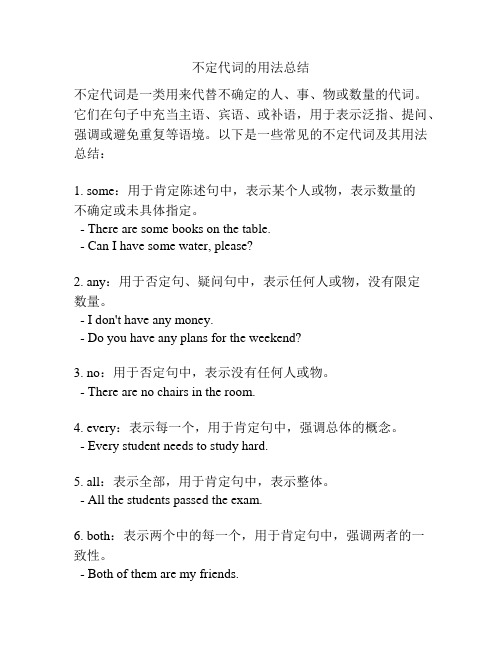
不定代词的用法总结不定代词是一类用来代替不确定的人、事、物或数量的代词。
它们在句子中充当主语、宾语、或补语,用于表示泛指、提问、强调或避免重复等语境。
以下是一些常见的不定代词及其用法总结:1. some:用于肯定陈述句中,表示某个人或物,表示数量的不确定或未具体指定。
- There are some books on the table.- Can I have some water, please?2. any:用于否定句、疑问句中,表示任何人或物,没有限定数量。
- I don't have any money.- Do you have any plans for the weekend?3. no:用于否定句中,表示没有任何人或物。
- There are no chairs in the room.4. every:表示每一个,用于肯定句中,强调总体的概念。
- Every student needs to study hard.5. all:表示全部,用于肯定句中,表示整体。
- All the students passed the exam.6. both:表示两个中的每一个,用于肯定句中,强调两者的一致性。
- Both of them are my friends.7. each:用于肯定句中,表示每一个。
- Each student has his own desk.8. either:表示两者中的任意一个,用于肯定句中,表示两者的二选一。
- You can sit in either chair.9. neither:表示两者都不,用于否定句中,表示两者都不是。
- Neither of them is correct.10. some:用于疑问句中,表示请求、建议或提议。
- Can you give me some advice?需要注意的是,不定代词的用法和位置会受到上下文和语法结构的限制,具体使用时需根据具体情况进行判断。
八年级不定代词的用法总结

八年级不定代词的用法总结不定代词是指不确定或未指定的代词,用于代替不确定的人或事物。
以下是八年级不定代词的用法总结:1. 不定代词作主语不定代词可以在句子中作主语,这时谓语动词要用单数形式。
- Somebody is using the phone in the next room.- Everyone likes to have a holiday.2. 不定代词作宾语不定代词可以在句子中作宾语,代替人或物。
- I didn't see anybody in the room.- I have something important to tell you.3. 不定代词作表语不定代词可以在句子中作表语,描述主语的性质或特征。
- That's nothing.- She is somebody in this company.4. 不定代词作定语不定代词可以在句子中作定语,修饰名词或代词。
- There is something wrong with my computer.- I need someone to help me with my homework.5. 不定代词的用法区别在使用不定代词时,需要注意以下区别:- some 和 any:some 用于肯定句和表示请求、建议的疑问句中;any 用于否定句和疑问句中。
- no 和 none:no 表示没有任何东西或人,相当于 not any;none 表示没有特定的东西或人,强调数量为零。
- each 和 every:each 表示两个或两个以上的人或物中的每一个,强调个体;every 表示三个或三个以上的人或物中的每一个,强调整体。
- 1、下载文档前请自行甄别文档内容的完整性,平台不提供额外的编辑、内容补充、找答案等附加服务。
- 2、"仅部分预览"的文档,不可在线预览部分如存在完整性等问题,可反馈申请退款(可完整预览的文档不适用该条件!)。
- 3、如文档侵犯您的权益,请联系客服反馈,我们会尽快为您处理(人工客服工作时间:9:00-18:30)。
不定代词总结一、不定代词 some 与 any 的用法区别一般说来,不定代词 some 用于肯定句中, any 用于否定句和疑问句中。
但是,在表示请求、邀请或征求意见的句子中,通常要用 some 而不用 any :Would you like some cake? 吃点蛋糕吗?Why not buy some bread? 为什么不买些面包呢?Shall I get some chalk for you? 要我帮你拿些粉笔来吗?【说明】不定代词 any 有时也用于肯定句中,此时表示“任何”:Any colour will do. 任何颜色都行。
Come any day you like. 随便哪天来都可以。
二、不定代词 many 与 much 的用法以及区别不定代词 many 和 much 都表示“许多”,但 many 修饰或代替可数名词(复数),与 few(少数)相对;而 much 用来修饰或代替不可数名词(单数),与 little(少量)相对。
在口语中两者主要用于非肯定句中:Did you see many people there? 你在那儿看见许多人了吗 ?We don 't have much time. 我们没有许多时间。
Much work has been done. 许多工作都已经做了。
You 've given me too much. 你已给我太多了。
Take as many (much) as you want. 你要多少拿多少。
I asked her a great many questions. 我问了她许多问题。
辨析: too much ; much too ; too many1、too much 常用作副词或代词 ,也可以用作形容词修饰不可数名词 .如:Is watching TV too much good or bad for your health? 电视看得太多对你的健康有益还是有害 ?You've given me too much. 你给我的太多了 .We've had too much rain lately. 最近我们这里的雨下得太多了 .2、much too 常作副词 ,后接副词或形容词 .如:He drove much too fast. 他开车开得太快了 .It is much too cold. 天实在太冷了 .3、too many 常用作形容词 ,修饰可数名词复数 .如:They built too many buildings last year. 去年他们建了许多楼房 .三、either 、 neither 的用法以及区别1 、用作副词。
either 也(不),用于否定句中。
如: I don 't like fishing, David doesn 't like fishing, either. 我不喜欢钓鱼,大卫也不喜欢。
neither 也不;用于肯定句,表示否定含义。
如: He can 't swim, and neither / nor can I. 他不会游泳,我也不会。
2 、用作代词。
范围多限定于两者之间,常用作主语。
either of 和 neither of + 名词 /代词的复数,作主语时,谓语动词用单数。
either表示"二者之一”;neither表示"两者都不”,其反义词是both。
如: Either of the knives is useful .两把刀都有用。
Neither of them was in good health, but both worked very hard .他们两人身体都不好,但都努力地工作。
3、用作连词:either…。
厂…不是.. 就是... neither…nor-嘅不....... 也不 .. 常用来连接两个并列成分,如并列主语、并列谓语等。
谓语动词保持就近原则,与离它最近的主语在人称和数上保持一致。
但应注意以下几点:1 .无论either…。
厂…还是neither…nor…,若连接两个单数数名词/代词作主语,后面动词用单数。
Either Mary or Lucy is coming .不是玛丽来,就是露西来。
2. 若连接两个复数名词 /代词作主语,后面动词用复数。
Neither my parents nor my grandparents are coming 我的父母不来,我的爷爷奶奶也不来。
3. 如果一个单数名词 /代词和一个复数名词 /代词一起作主语时,动词的单复数形式必须和最靠近的一个主语保持一致。
(就近原则)四、all , both的用法以及区别,两者表示“都”,“全部”。
(1) both指两个人或物,而 all指三个以上的人或物,在句中都可作主语、宾语、表语、同位语或定语。
Both of us want to go. 我们两人都想去。
All of us should work hard. 我们都应努力工作。
(2) both 和 all 都可直接修饰名词;名词前如有限定词时,其前只能用both of 或 all of 。
Both brothers are clever. 兄弟俩都聪明。
Both of the books are useful. 两本书都有用。
(3) both 和 all 在句中的位置是位于 be 动词之后,行为动词之前,如有情态动词或助动词,则位于情态动词或助动词与主动词之间。
We are all here. 我们都来了。
五、The other, others, the others, another 它们的用法现归纳如下:1. Other 可作形容词或代词,做形容词时,意思是“别的,其他”,泛指“其他的(人或物)”。
如: Do you have any other question(s)? 你还有其他问题吗? Ask some other people. 问问别人吧!Put it in your other hand. 把它放在你另一只手里。
2. The other 指两个人或物中的一个时,只能用 the other ,不能用 another ,此时的 other 作代词。
如: He has two daughters. One is a nurse, the other is a worker. 他有两个女儿,一个是护士,另一个是工人。
The other 后可加单数名词,也可加复数名词,此时的 other 作形容词。
如: On the other side of the street , there is a tall tree. 在街道的另一边,有一棵大树。
Mary is much taller than the other girls. 玛丽比其他的女孩高得多。
He lives on the other side of the river. 他住在河的对岸。
3. Others 是 other 的复数形式,泛指“另外几个”,“其余的”。
在句中可作主语、宾语。
如: Some of us like singing and dancing, others go in for sports. 我们一些人喜欢唱歌和跳舞,其余的从事体育活动。
Give me some others, please. 请给我别的东西吧! There are no others. 没有别的了。
4. The others 意思是“其他东西,其余的人”。
特指某一范围内的“其他的(人或物)”。
是 the other 的复数形式。
如: Two boys will go to the zoo, and the others will stay at home. 两个男孩将去动物园,其余的留在家里。
the others=the other 复数名词六、every 和 each1)e very 强调全体的概念, each 强调个体概念。
Every student in our school works hard. 我们学校的学生都很用功。
Each student may have one book.. 每个学生都可有一本书。
2)e very 指三个以上的人或物(含三个),each 指两个以上的人或物(含两个)。
3)e very 只作形容词,不可单独使用。
each 可作代词或形容词。
Every student has to take one.Each boy has to take one.Each of the boys has to take one.4)e very 与 not 连用,表示部分否定; each 和 not 连用表示全部否定。
Every man is not honest. 并非每个人都诚实。
Each man is not honest. 这儿每个人都不诚实。
七、不定代词 few, a few 与 little, a little 的用法区别1. 不定代词 few 和 a few 后接可数名词的复数形式。
few 表示数量很少或几乎没有,强调“少”,含有否定意义;a few 表示数量虽然少但毕竟还有,强调“有”,含有肯定意义:It is very difficult, and few people understand it. 它很难,没有几个人能懂。
他虽难,但是有些人懂。
few 和a few 之间的区别相似:It is very difficult, but a few people understand it.2. little 和 a little 之后接不可数名词,其区别跟Fortunately, I had a little money on me.幸好我身上带着一点钱。
不定代词总结一、指两者和三者的不定代词有些不定代词用于指两者 (如 both, either, neither) ,有的不定代词用于指三者 (如 all, any, none, every) ,注意不要弄混:Both of my parents are doctors. 我的父母都是医生。
All of the students are interested in it. 所有的学生对此都很感兴趣。
There are trees on any side of the square. 广场的每一边都种有树。
He has two sons, neither of whom is rich. 他有两个儿子,都不富有。
He has three sons, none of whom is rich. 他有三个儿子,都不富有。
